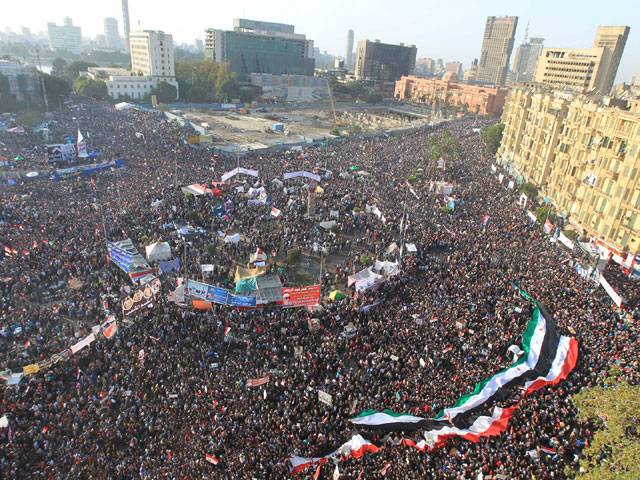CAIRO - Egyptians poured into Tahrir Square on Wednesday to mark one year since the launch of the uprising that toppled Hosni Mubarak, with activists vowing to revive their unfinished revolution and the ruling army labelling it a day of celebration.
Tens of thousands of Islamists, liberals, leftists and ordinary citizens packed the square, the epicentre of protests that ousted Mubarak, waving flags and bearing banners reflecting the day’s varying messages.
The powerful Muslim Brotherhood, which dominates the newly elected parliament, was there to celebrate one year since Egyptians — inspired by an uprising in Tunisia — took to the streets to topple the regime.
But other groups, including pro-democracy movements behind the revolt, insisted they were at Tahrir to reignite their revolution and demand the ouster of the military council that took over when Mubarak quit.
Several marches set off for Tahrir from different parts of Cairo, with the chant of “Down with military rule!” ringing across the capital. Thousands also packed a waterfront square in the Mediterranean city of Alexandria, where the ruling Supreme Council of the Armed Forces (SCAF), headed by Field Marshal Hussein Tantawi, had planned a naval parade.
In the canal city of Suez, around 5,000 protesters gathered in the main square chanting: “From Suez to Tahrir, down with the Field Marshal.”
“This is a demonstration, not a celebration,” said Mustafa al-Masry, one of the leaders of a Suez-based revolutionary group.
In Cairo, huge flags hovered over the protesters in Tahrir, where a military band attempted to entertain the crowds in the morning.
But calls of “Down, down with military rule” drowned out the music, forcing the band to be shuttled away by bus.
“We will keep going to Tahrir to push for the goals of the revolution, no matter what,” said Hala Rashad, a 46-year-old chef.
“The military council has done nothing. They are behaving just like the old regime. We have not received our rights and the country is a mess,” she said.
At the entrances to Tahrir, “popular committees” searched protesters after the interior ministry said there would be no police presence at the square.
Several members of the Muslim Brotherhood’s youth told AFP they were in the square to demonstrate, not celebrate, despite an announcement by the group that it would not be pushing for “a second revolution.”
The big question, reflected in the headline of the state-owned weekly Al-Ahram Hebdo, remains “Who will capture the soul of the revolution?”
On Tuesday, Tantawi announced the partial lifting of a hated decades-old emergency law, in an apparent bid to placate protesters, but said the law would still apply to acts of “thuggery.” Activists called the move cosmetic, denouncing the term “thuggery” as a way to maintain the police’s wide powers of arrest. “January 25 is the first anniversary of the day when Egyptians stood up together to demand an end to police abuse and the state of emergency,” said Joe Stork, deputy Middle East director at Human Rights Watch.
“It is an insult to all those calling for a return to the rule of law to make excuses to keep this state of emergency, used abusively for so many years, in place,” he said.
Eager to restore its image after accusations of rights abuses, the military has planned mass celebrations with a naval parade off Alexandria, air shows in Cairo and fireworks displays nationwide.
The SCAF is also issuing commemorative coins and on Wednesday it began releasing almost 3,000 prisoners to mark the occasion.
It has called on Egyptians to “preserve the spirit of January 25, which united the Egyptian people, men and women, young and old, Muslims and Christians.”
But protesters say the revolution has been hijacked by Tantawi, Mubarak’s long-time defence minister.
They want him and the ruling generals to step down immediately and to stay out of drafting Egypt’s new constitution, for fear they may enshrine military powers into it.
The SCAF has vowed to cede power to civilian rule when a president is elected by June.
Security forces say they are on alert for “any attempts to sabotage” the celebration, a thinly veiled warning to protesters.
But Interior Minister Mohammed Ibrahim said the police “will not be present in the squares or where large celebrations are taking place” and called instead on political forces to “form popular committees” to secure the streets.
Amnesty International said the military rulers must protect protesters and uphold the right to peaceful assembly.
“Rather than abandoning the sites of planned demonstrations, the security forces must act responsibly by ensuring that everyone can safely exercise their right to peaceful expression and assembly,” said Hassiba Hadj-Sahraoui, Middle East and North Africa deputy director.
Mubarak himself will mark the anniversary from a bed in a Cairo military hospital, accused of involvement in the killing of protesters during the uprising.
If found guilty, the former president of 30 years could face the death penalty.
Saturday, April 20, 2024
Egyptians march on protest anniversary

Freedom Flotilla prepares for humanitarian aid delivery to Gaza
9:14 AM | April 20, 2024
22 suspects arrested
April 20, 2024
Policitising Tragedy
April 20, 2024
Tehran to Rafah
April 20, 2024
A New Leaf
April 20, 2024
A Tense Neighbourhood
April 19, 2024
Dubai Underwater
April 19, 2024
Dangers of Deepfakes
April 20, 2024
Feudalism
April 20, 2024
Kite tragedy
April 19, 2024
Discipline dilemma
April 19, 2024
Urgent plea
April 19, 2024
ePaper - Nawaiwaqt
Advertisement
Nawaiwaqt Group | Copyright © 2024





